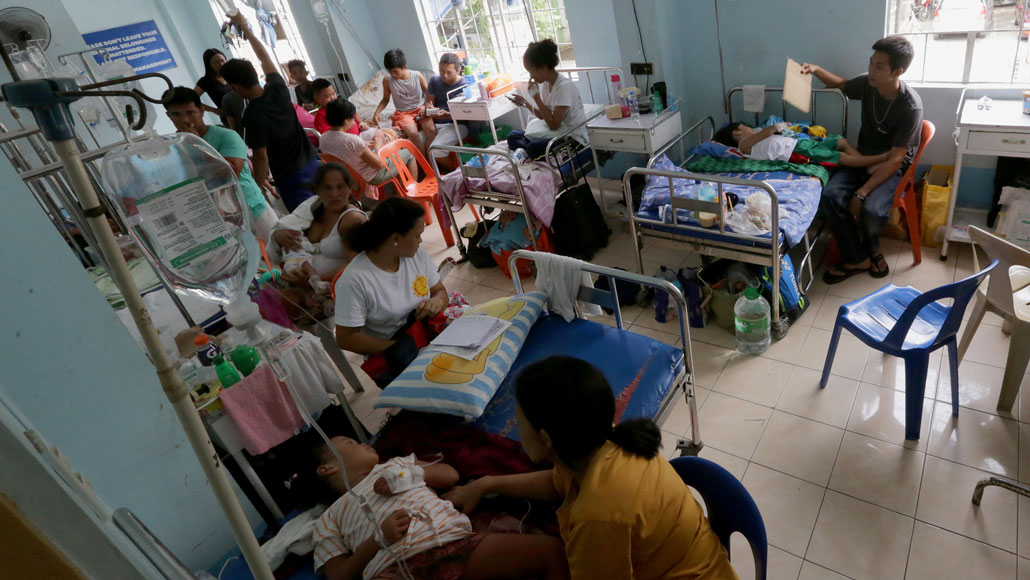A new dengue vaccine shows promise — at least for now
Further study is needed to ensure people aren’t left vulnerable to future infections

Sick patients fill a dengue ward in a hospital in Laguna province, the Philippines, in August 2019. The country is experiencing a dengue epidemic, with close to 350,000 cases, including around 1,300 deaths, as of early October.
Xinhua/Alamy Stock Photo
The latest dengue vaccine reduced the occurrence of the disease by about 80 percent in children vaccinated compared with unvaccinated children, researchers report. But the full picture of the vaccine’s safety and effectiveness is still under study, and won’t emerge for several more years.
Dengue is responsible for an estimated 390 million infections each year. There’s no cure for the viral disease, which can cause fever, aches, pain and — in severe cases — bleeding, vomiting and rapid loss of blood pressure, which can be fatal. Young children and the elderly are especially vulnerable to developing severe disease.
The new vaccine, under development by Takeda Vaccines, is called TAK-003. Among 12,700 children ages 4 to 16 who were given two doses of TAK-003 three months apart, 61 infections occurred, compared with 149 cases among 6,316 children not given the vaccine. TAK-003 also reduced the occurrence of dengue cases that lead to hospitalization by 95 percent: Of the 210 cases of dengue, there were five hospitalizations among the vaccinated children compared with 53 in the unvaccinated ones, researchers report online November 6 in the New England Journal of Medicine. The results describe how the vaccine performed in the year after the second dose; the children, from Asia and Latin America, will continue to be followed another 3½ years.
Dengue, one of the world’s most rapidly spreading mosquito-borne diseases, is gaining footholds in new areas thanks to global travel, urbanization and climate change (SN: 10/7/19). Along with measures to control mosquito populations, developing a vaccine is seen as key to fighting dengue, says Derek Wallace, a physician who heads the dengue vaccine development program at Takeda Vaccines in Cambridge, Mass.
But creating a vaccine against dengue is challenging. There are four different, but closely related, dengue viruses, labeled by number. A person infected by dengue type 1, for example, develops antibodies to that type. But those antibodies can conspire to make a second infection with a different dengue virus severe (SN: 11/8/17).
This phenomenon, called antibody-dependent enhancement, “plagues vaccine development,” says Scott Halstead, a virologist who has spent his career studying dengue and first described this enhancement in the 1960s. If a vaccine doesn’t produce a strong and long-lasting immune response to all four of the viruses, it could mean a later infection not only isn’t protected against, but is actually made worse.
That’s what happened with the first widely used vaccine candidate, Dengvaxia, developed by the pharmaceutical company Sanofi Pasteur, based in Lyon, France. In a 2015 study, researchers reported the vaccine reduced the occurrence of dengue by around 60 percent in vaccinated children. But in 2017, the company announced the vaccine shouldn’t be used in children who hadn’t been previously exposed to dengue. A huge vaccination campaign in the Philippines was halted, and reports surfaced of some children becoming very ill after vaccination (SN: 5/21/19).
“The vaccine was acting as a silent first infection in those kids who hadn’t been exposed in the past,” says infectious disease epidemiologist Isabel Rodriguez-Barraquer of the University of California San Francisco School of Medicine, who was not involved in the development of either vaccine. After reanalyzing the data from the Dengvaxia clinical trials, scientists reported that the vaccine protected kids who already had been exposed to dengue, but increased the risk of severe infections in kids who hadn’t been, according to a study published July 2018 in the New England Journal of Medicine.
Going forward, it will take a lot of transparency from vaccine manufacturers and questioning from the scientific community “to make sure that the same thing doesn’t happen again,” Rodriguez-Barraquer says. “I do hope eventually there will be a dengue vaccine that will be accepted,” she says. “It would help a lot of people.”
The new vaccine by Takeda uses a weakened version of dengue type 2 virus as its backbone with bits of the other dengue viruses added to it. By comparison, the Sanofi Pasteur vaccine was made with a yellow fever virus that incorporated pieces of each of the dengue viruses.
Takeda tested whether children in its study had been exposed to dengue before vaccination. Initial results didn’t find a large difference between the groups: The vaccine reduced the occurrence of disease by close to 75 percent in those not previously infected with dengue, and by 82 percent in those who had been. But the extent of the vaccine’s protection won’t be clear until the longer term results are available.







